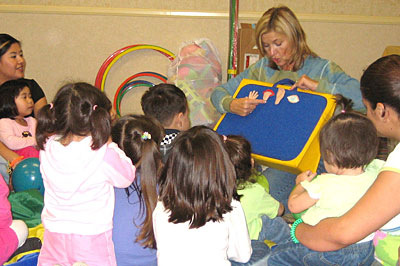ARTICLES
Active Play
MOVING TO LEARNUP, UP AND AWAY!
Getting Ready for Parachute Play
UP, UP AND AWAY!
Getting Set for Parachute Play
Circle Time
DON'T SIT LIKE A WSUCCESSFUL CIRCLE TIME
Policing Leadership
BE A HERO OR BE A HEADLINESUCCESSFUL CIRCLE TIME
Tips for a more effective and enjoyable group time.

Download Article
*Download a printable PDF
Circle time, also called group time, refers to any time that a group of children are together for an activity. It's a special time to share fingerplays, chants, and
rhymes; sing songs; play rhythm instruments; read a story; and participate in movement games and relaxation activities. Circle time is also a wonderful time to develop
listening skills and attention spans, promote oral communication, teach new concepts and skills, and have FUN. The following tips will help you make your group time
more effective and enjoyable for all involved.
Plan it out. Schedule two circle times -one at the beginning of the day and the other at the end of the day. The first group time builds a sense of community by acknowledging
"who's here" and "what's happening." The closing circle time should include activities appropriate to the children's age, experience, and development. Some examples might
include music, poetry, fingerplays, games, puppets, flannel board stories, and creative activities.
Location, Location, Location. Set up an area for circle time so that children face away from an open door, ongoing preparations for another activity, or any other
distractions. If you have a large, colorful educational area rug, have children find an animal, number, shape, or letter to sit on. You can also place tape on the
floor in the shape of a circle or purchase small carpet squares or cushions to designate each child's "personal" space.
Don't Sit Like a W. How the children sit at circle time is important, too. The phrase "CRISS CROSS APPLESAUCE" serves as a helpful reminder for children to sit in
a healthy, safe way. Encourage children to sit cross-legged or sit with their feet in front of them. Discourage the unhealthy and even potentially harmful sitting
habit known as W sitting. W sitting is described as sitting between your legs, knees turned in, and feet out to the sides.
Keep Your Circle Times Short. Toddlers have a maximum attention span of five to 10 minutes and most three- to five-year- olds can only attend for up to 15 minutes.
Involve Everyone! Do not force children to participate in circle time. To some children, being "actively involved" is watching, listening, and sensing. Encourage
shy children to join in when they are comfortable and ready.
Model and Reward Appropriate Behavior. Do not allow one child to ruin circle time for the entire group. If a child is disruptive, ask him to sit in a nearby chair
and watch circle time as part of the "audience." Encourage the child to return when he is ready to join in and cooperate. Acknowledge and reinforce appropriate
behavior. Tell the children what good listeners they are, how well they can control their bodies, what great voices they have, etc.
Organize Activities in a Sequence. Sequenced activities help children learn and do what is expected.
- Welcome children to circle time with a hello song or name game.
- After the group has gathered, increase children's alertness with an active or familiar song.
- Then move on to a fingerplay or body part chant/rhyme.
- Next, get everybody up and off their bottoms with an energizing activity, such as a movement or action song. Engage and actively involve children, enhancing gross motor development and coordination.
- Follow this with a calming activity that helps focus children's attention by reading a story, participating in a discussion or demonstration, or inviting children to be in a "play."
- Signal that group time is over by gradually dispersing the group with a transition activity such as a closing or goodbye song.
Relevant Workshop
GIGGLES & WIGGLES! Music and Movement Activities for Circle Time
